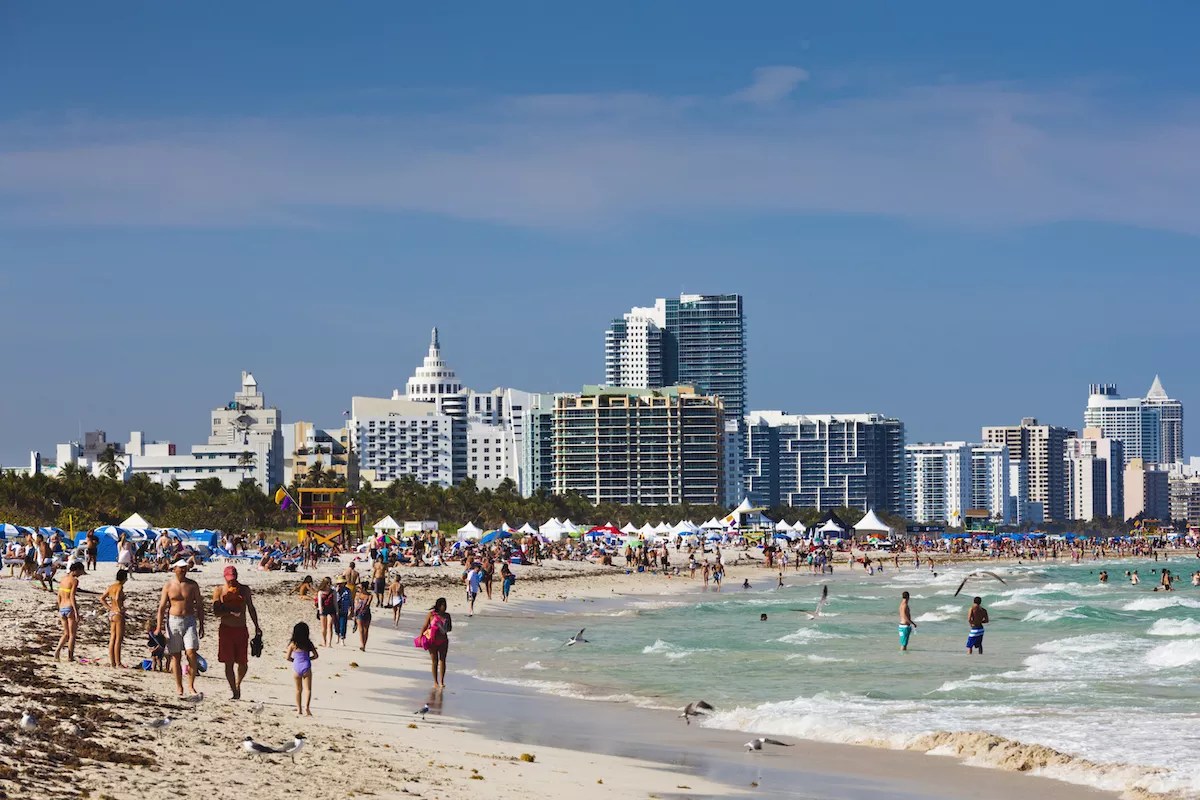
Photo by Walter Bibikow/Getty Images

Audio By Carbonatix
Miami’s tourism industry is at the center of a growing debate after proposed state legislation threatened to strip millions in local tourism funding.
Rep. Monique Miller and Rep. Fabián Basabe, both Republicans, in February introduced H.B. 1221, which aims to remove the Tourist Development Tax (TDT), a state and local tax that resorts, hotels, restaurants, and rental properties pay to help fund tourism marketing and development.
It would require local governments to divest the funding collected from the TDT into other areas and dissolve all county Tourism Development Councils, nine-member volunteer boards established under Florida law to promote tourism and stimulate local economic growth through cultural and special events.
In 2023 and 2024, Miami-Dade County collected $61 million in tax revenue via the TDT, generating $3.8 billion for Florida, according to Curtis Crider, President and CEO of the Greater Miami and the Beaches Hotel Association. In 2024 alone, Miami’s tourism economy generated over $2 billion in tax revenue for the state, creating an average tax saving of $2,200 per household.
Miami hotels’ TDT rate is 2 percent, though Miami Beach, Surfside, and Bal Harbor hotels charge 4 percent. Crider says Miami Beach, Coconut Grove, and downtown Miami are the strongest-performing tourist areas in Miami-Dade County.
According to Crider, the funding collected through the TDT supports over 200,000 jobs in various industries throughout greater South Florida. If Miami loses its tourism marketing and development funding, many workers in those sectors can expect reduced wages and layoffs.
Crider says funding cuts would also impact investments in education, public safety, transportation, arts and culture, and other sectors, which are all necessary to maintain and improve tourism in Miami.
As Miami approaches summer, signs point to another strong tourist turnout, even amid President Donald Trump’s tariffs and trade wars.
“We’re coming out of our first quarter. There’s been some recent news regarding tariffs that have slowed travel in certain specific areas, but we’ve seen a lift in areas like Argentina,” Crider says. “People love coming to Miami-Dade County in the summer, so different areas are seeing lifts, but you are seeing some decreases in other areas.”
Tourism marketing isn’t just nice to have; it really is our business driver, our job creator. It’s really the tip of the spear for the future of economic development, not only here in Miami-Dade County, but also in the state of Florida.”
Many Miami Beach business leaders, like David Wallack, owner of the popular Mango’s Tropical Cafe, have a different outlook. In the past, Wallack has objected to government initiatives that drive away tourism (like the hilarious “Breaking up with Spring Break” campaigns discouraging tourists from visiting the 305, lest they encounter $100 parking, DUI checkpoints, and restricted beach access).
He says the Miami-Dade County Convention and Visitors Bureau has neglected Miami Beach for years. In a time when businesses like his are “suffering considerably,” he says, it would be best for business owners to decide how to spend money themselves, rather than leaving it to local government.
“It seems like it would benefit the businesses make city and county governments look elsewhere in their budgets for those marketing dollars,” Wallack says.
Jay Shirodkar, president of Shirodkar Industries, which comprises many South Florida-based hospitality businesses, including Naked Taco, says the development tax has hurt Miami Beach restaurants and bars more than it has helped.
“I don’t know that removing the tax altogether is the right move, but I definitely think there needs to be a realignment of goals and talk about what tourism is, because in my perspective right now, I think I can confidently say tourism is not being welcomed on South Beach,” Shirodkar says.
“If somebody has a real plan to ‘clean up the beach’ while still allowing us to feed in all that tourist traffic, I’d be open to talking about a tourist development tax, but in the current state, I wouldn’t want to pay anything because I feel like the city a lot of the time is working against us.”
Editor’s Note: After publication, Rep. Basabe reached out with the following message:
“This legislation is not about dismantling tourism. It is about restoring balance. For years, millions in tourist tax dollars have been funneled into marketing campaigns and politically favored projects, while residents are left to deal with skyrocketing costs of living, collapsing infrastructure, and a worsening housing crisis.
Redirecting a portion of those funds toward property tax relief, essential services, and critical infrastructure is not just common sense. It is long overdue. For too long, we have marketed to a high-impact, low-quality brand of tourism that depletes our resources, overwhelms our city, and damages our natural environment. Meanwhile, the people who keep Florida running are being priced out and pushed aside. If we want a sustainable future, we need to reinvest in them – not just in the image we sell to visitors.
Some critics are quick to tie this to national debates on trade or tariffs. But this is not about partisan politics. This is about local accountability. This bill gives counties the option to use tourism tax revenue in a way that actually benefits the communities generating it. It ensures that growth works for everyone, not just those at the top.
Floridians deserve a fair return on their contributions. They deserve a government that puts them first.”